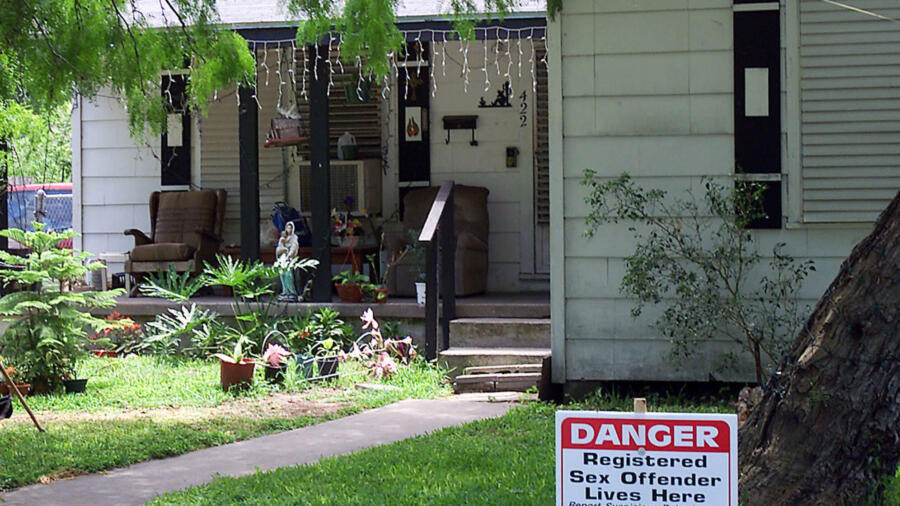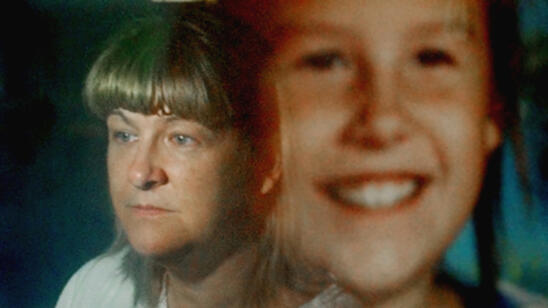In June 2017 Karin Ahrman of Ocala, Florida, received a flyer in her mailbox notifying her that a registered sex offender had moved to her neighborhood. Ahrman, who has a 13-year-old son, soon realized his home was only a few houses away—not only close to her home, but also to other homes with children as well as two schools. Ahrman asked around to see if other neighbors received the flyer and discovered it had only been distributed to a few houses close to the offender. This is when she took matters into her own hands. She talks to A&E True Crime about her fight to inform her community about their need for vigilance against sexual offenders.
What is your neighborhood like?
It is really quiet and friendly. When we moved here, 15 years ago, it was all senior citizens. Now the houses are being sold to younger families. On this block, there’s an apartment building with a lot of kids, and these kids walk past [the offender’s] house to and from elementary school every day. The reason I put the sign out was for the kids to know to watch for him and for parents to be aware, because we only got the notice within 12 houses of him. It didn’t go very far around the neighborhood. I walked two blocks down and asked if they got it, and they didn’t.
What upset you the most?
I was shocked that [this man] can be that close to schools. That’s my main thing. And children live right next door to him! How is that possible? …[If you’re a registered sex offender in Florida, the rules are] you can’t be within 1,000 feet of a school, you can’t go to a playground, you have to stay, I think it’s 1,000 feet from a playground or anywhere where kids live or congregate, such as libraries, ice cream parlors and toy stores.
Some jurisdictions have community notification meetings where they might tell you what kind of supervision an offender is under or what restrictions he has. Did yours?
No. We had to look him up on the federal sex-offender site. He’s not just a person that has offended once. He’s identified as a predator on the site. He has multiple convictions—not accusations, convictions. He did time. He got out [of prison] then he did it again, and did more time. Now he’s down my street.
What happened after you started telling people?
When he first got here, I posted the information on my Facebook page. A friend of mine contacted me privately. She said that she has relatives with children (10 to 12 years old) who go to this house after school. The family had no idea that they were going to the house of a predator and staying there two or three hours. Without my post, they would never have known to pull the kids out of there.
When you put the sign out in your front yard, what kind of reaction did you get?
That was kind of mixed. And I had to fight my husband about it. I literally told him, ‘We will divorce over this sign. The sign will stay here.’ I was molested when I was four. I was raped when I was 12, so this is personal to me.
We have [the offender’s] picture on the sign. And I only put what was public knowledge on it. People tried getting me to take it down. They called the police. And [the police] all said that it’s perfectly legal. It’s no different from me putting up a political sign, a religious sign or whatever, because it’s my property. It was the facts that were put in my mailbox. It was public knowledge.
On the National Sex Offender Public Registry website there is a disclaimer that says, ‘Any person who uses information contained in…this Website to threaten, intimidate, or harass any individual, including registrants or family members, or who otherwise misuses this information may be subject to criminal prosecution or civil liability under federal and/or state law.’ Did anyone claim that you were harassing the guy?
Somebody did say, ‘You know, you could be charged with harassment.’ And I said, ‘How am I harassing him? I’m not going to his house. I’m not threatening him. I’m not speaking to him. I’m not interacting with him.’ He did come here to interact with me once, and I told him the facts. ‘It’s my driveway. Do not stop here. Do not call here.’
Did he say why he came to talk to you?
At first, I had 100 flyers printed up and I put them on every telephone pole between my house and all of the schools, and he was right behind me ripping them down. He stopped and asked, ‘Why are you doing this?’ And I said, ‘Because they need to know about you. Go ahead and tear the flyers down, because the next sign is going to be even bigger.’ That’s when I put my yard sign up. I bet he’s wishing he would have left up the little flyers with his picture on them. They were so small, you could barely see it. Now his face is all over.
Do you plan on doing anything else to spread the word?
There’s really not much else I can do, because then I would be charged with harassment. I did have some professionals contact me that wanted me to get a crowd together so they could do a free presentation for kids to teach them a few things [about safety] when dealing with strangers]. [Unfortunately] I couldn’t even round up a class of 30.
Did your neighbors complain that you were bringing down their property value and things like that?
I had a lot of people say that. ‘Oh, you’re just hurting the neighborhood.’ And I’m like, ‘I’m not! He is! There’s the problem in the neighborhood—not me.’
Did you look on the NSOPR website to see how many other convicted sexual offenders were within a radius of your house? [Editor’s note: You can do this in Florida, but information is not available for every state.]
I didn’t. It’s not like I want to cause a problem for everyone. I want my son to be very aware. He’s autistic on top of being [the offender’s] target age. He’s not street smart and he’s been very protected. He’s watched very closely, but not all kids are that lucky.
I was one of those kids that wasn’t that lucky. I suffered [sexual abuse] twice for that. So, if I can save one child—just one—from that, then it’s worth whatever the neighborhood wants to throw at me.
Read more: What Can You Do If a Registered Sex Offender Moves to Your Neighborhood?


